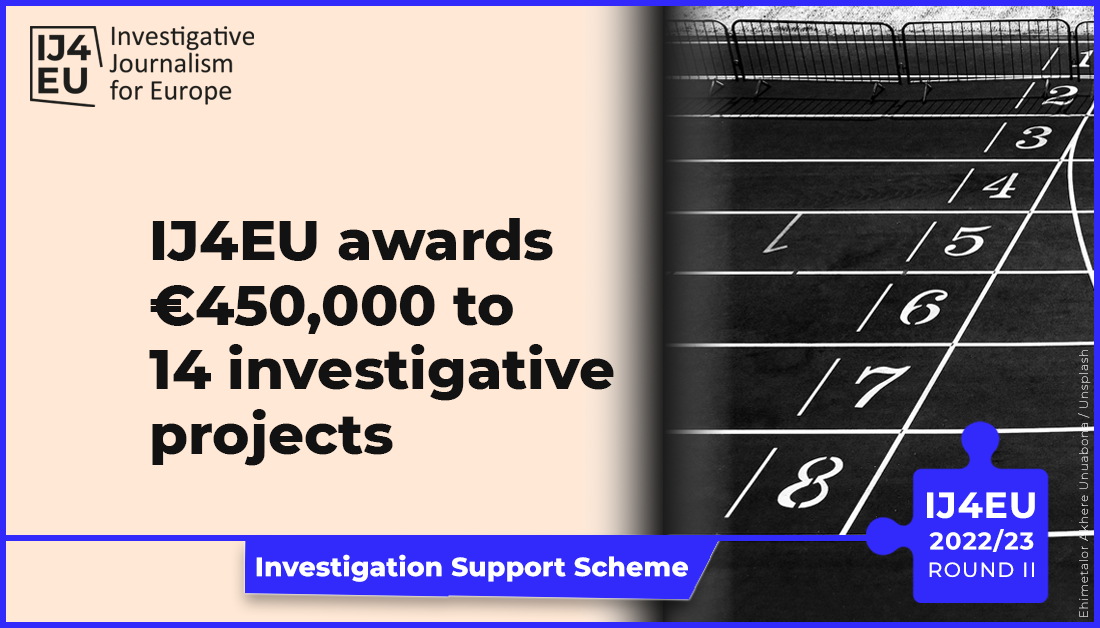Arms manufacturing, cryptocurrency and European brown bears are just some of the topics set to be tackled by 14 cross-border teams awarded funding under the latest call of IJ4EU’s flagship Investigation Support Scheme.
An independent jury allocated a combined €450,000 to journalistic teams hailing from four corners of the European Union and 10 countries further afield.
Run by the Vienna-based International Press Institute, the Investigation Support Scheme allows watchdog journalists in Europe to collaborate on transnational investigations in the public interest.
14 investigations
In no particular order, the successful projects are:
- A cross-border investigation into the supply of ammunition to Ukraine – €43,800
- An investigation by an international team of journalists and data scientists into opaque transnational corporate structures and their role in accelerating the climate crisis – €34,500
- A cross-border investigation into European links to illegal mining in the Amazon – €28,877
- An investigation led by Delfi Estonia into the business of cryptocurrency companies in the Baltic region – €24,510
- A cross-border investigation into the impact of Southern Europe’s brown bear surge – €45,000
- A cross-border investigation led by Rue89 Strasbourg into a dangerous source of pollution in one of Europe’s greatest sources of drinkable water – €10,000
- A visual Investigation by Outriders (Poland), El Confidencial (Spain), porCausa (Spain) and Solomon (Greece) into Europe’s border industry – €35,000
- A cross-border investigation into the dark side of European fashion – €30,470
- A cross-border investigation led by IrpiMedia into Europe’s addiction to fossil fuels, from smuggling and sanction evasion to dodgy deals with antidemocratic regimes – €40,000
- An investigation into severe labour exploitation in Southern Europe – €33,449
- An investigation by a team of Latvian, Estonian and Hungarian journalists, led by Re:Baltica, into the organised trafficking of illegal migrants from the Belarusian border and further into Europe – €27,581.65
- A cross-border investigation into arms manufacturing – €19,400
- A cross-border investigation into land ownership in European capitals by journalists in five countries within the European Cities Investigative Journalism Accelerator network – €43,320
- A Lost in Europe investigation into an as-yet-unseen group of trafficking victims in Europe: transgender sex workers from Latin America – €35,750
‘Bad guys don’t care about borders’
Projects were chosen by a jury of distinguished journalists from across Europe, chaired by Nataliya Gumenyuk, an award-winning Ukrainian reporter and author who founded and runs the Public Interest Journalism Lab, which promotes constructive discussion around complex social issues.
“What we feel in Ukraine today, in a very acute way, is that journalistic work has a real-life impact,” Gumenyuk said. “An investigation can stop the production of a deadly weapon that kills civilians. But it can also prompt the dismissal of a person who is responsible for wrongs, change a regulation that had an impact on climate and health or fight injustices to which vulnerable groups are exposed, whether refugees, migrants or unfairly treated citizens.
“We also understand that the bad guys don’t care about borders, while the good ones often don’t know how to cooperate. While making decisions, we thought about all that — how to support cross-border collaborations that wouldn’t otherwise be possible.
“We supported projects that serve the public good and public interest. We also tried to cover more themes, topics, regions and media, so beyond supporting the best, there would be a fair distribution of funds for maximum impact.”
The successful proposals were chosen from almost 120 applications to the latest call of the Investigation Support Scheme, which provides grants of up to €50,000 along with training and networking opportunities.
Journalists in 27 countries
The 14 teams awarded include journalists based in 27 countries — 17 EU member states, five EU candidate countries and five other countries: Brazil, Senegal, United Arab Emirates, the United Kingdom and the United States.
The Investigation Support Scheme has a total pot of €900,000 for the 2022/23 edition of IJ4EU. In November, the jury awarded €450,000 to 13 teams after the scheme’s first call of the edition.
The Investigation Support Scheme runs in parallel to another IJ4EU funding and mentoring programme, the Freelancer Support Scheme, designed primarily for journalists operating outside of newsroom structures.
Results of the Freelancer Support Scheme, run by the Maastricht-based European Journalism Centre, will be announced shortly.
IJ4EU will not launch further calls for grant applications in 2023.
Independence sacred
Editorial independence is a cornerstone of IJ4EU grant schemes. IJ4EU’s financing model allows public and philanthropic money to flow to investigative journalism in Europe without any question of editorial interference.
Last week, IPI unveiled the identities of the five distinguished journalists who presided over the Investigation Support Scheme for the 2022/23 funding round.
Along with Gumenyuk, the jury members were Aritz Parra, Southern Europe news director for the Associated Press; Ioana Avadani, president of the Center for Independent Journalism in Romania; Leif Lonsmann, a senior advisor and board member of the Nordic Journalist Centre in Denmark; and Natalia Antelava, co-founder and editor-in-chief of Coda Story.
The criteria used to select the projects are published on the IJ4EU website and include newsworthiness and public interest, expected impact, cross-border relevance, the strength of research and publication plans, feasibility and adequate risk assessment.
Altogether, IJ4EU has allocated more than €1.23 million in grants in 2022/23, alongside other forms of assistance such as mentoring, practical support and legal help.
IJ4EU also honours excellence in cross-border investigative journalism with cash prizes. The winners of this year’s IJ4EU Impact Award, managed by the European Centre for Press and Media Freedom, will be announced on March 31.
